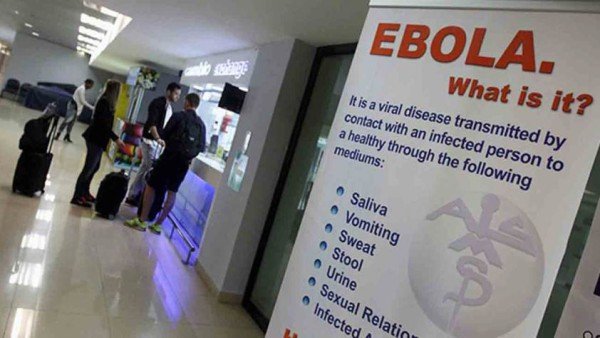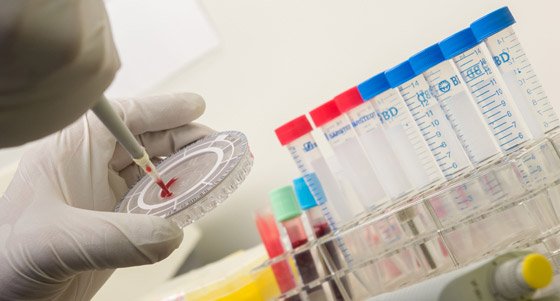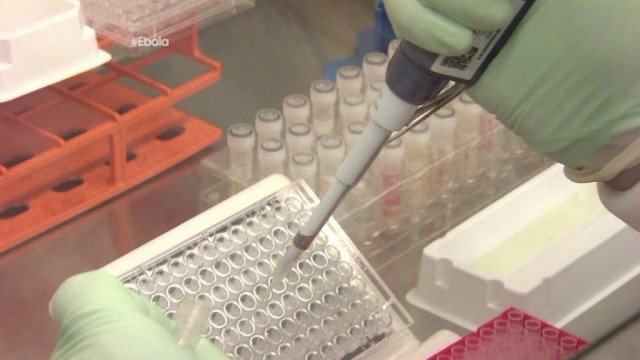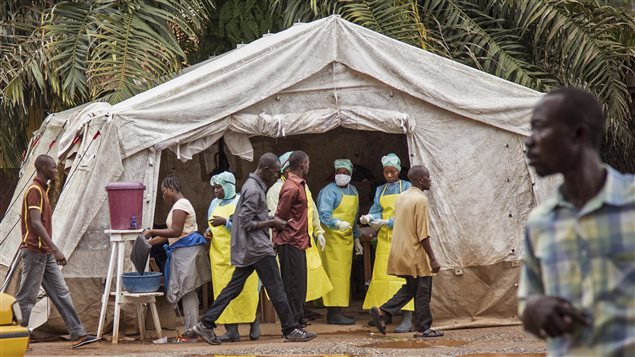Home Tags Posts tagged with "ebola drug"
ebola drug
A new Ebola drug has cured monkeys infected with the virus, US researchers announced.
Experimental drug TKM-Ebola-Guinea targets the Makona strain of the virus, which caused the current deadly outbreak in West Africa.
All three monkeys receiving the treatment were healthy when the trial ended after 28 days.
Three untreated monkeys died within nine days.
However, scientists cautioned that the drug’s efficacy has not been proven in humans.
Currently there are no treatments or vaccines for Ebola that have been proven to work in humans.
Thomas Geisbert from University of Texas, who was the senior author of the study published in the journal Nature, said: “This is the first study to show post-exposure protection… against the new Makona outbreak strain of Ebola-Zaire virus.”
Results from human trials with TKM-Ebola-Guinea are expected in the second half of this year.
Thomas Geisbert said the drug, produced by Tekmira Pharmaceuticals, could be adapted to target any strain of Ebola and could be manufactured in as little as eight weeks.
TKM-Ebola-Guinea works by blocking particular genes, which stops the virus replicating.
The two-month production time compares with the several months needed to make ZMapp – another experimental drug, which cured monkeys with a different strain of Ebola than the one in the current outbreak.
Since March 2014, more than 10,602 people have been reported as having died from the disease in six countries – Liberia, Guinea, Sierra Leone, Nigeria, the US and Mali.
The total number of reported Ebola cases is more than 25,556.
A trial of brincidofovir – a potential drug to treat Ebola – has started at a Medecins Sans Frontieres center in Liberia.
The antiviral is being tested on Ebola patients on a voluntary basis. People who do not consent to it receive standard care.
Oxford University scientists leading the research say initial results are expected in the next few months.
A study involving a similar drug – favipiravir – began in Guinea in December.
More than 8,000 people have died from Ebola during this outbreak, the majority in the worst-affected countries of Guinea, Sierra Leone and Liberia.
While a handful of experimental drugs, including brincidofovir and favipiravir, have been given on an ad hoc, compassionate basis in the last year, none has yet been proven to work against the virus in scientific human trials.
A huge international effort – involving the WHO, MSF, drug companies, the Wellcome Trust, and other global health organizations – aims to fast-track treatments that have been identified as potential options.
Prof. Peter Horby, one of the chief investigators at Oxford University, said: “Conducting clinical trials of investigational drugs in the midst of a humanitarian crisis is a new experience for us all, but we are determined not to fail the people of West Africa.
“We are trying a number of different approaches simultaneously as there is only a short window of opportunity to tackle this virus during the outbreak.”
Scientists at Oxford say brincidofovir was chosen because it is effective against Ebola-infected cells in laboratories, has been deemed safe in more than 1,000 patients in trials against other viruses and can be given conveniently as a tablet.
Researchers aim to recruit more than 100 people and will compare death rates at the centre before and after the trial.
The other antiviral drug, favipiravir, being tested by the French National Institute of Health, is already used to treat influenza.
It is offered to all patients who receive care at the MSF treatment centre in Gueckedou, Guinea, and early results are expected in a few months’ time.
Scientists are testing other drugs and treatments.
Oxford University and the company Tekmira hope to establish a further study of a potential treatment which aims to interrupt the genetic code of the virus called TKM-Ebola.
Another approach is to use blood plasma from patients who have recovered from the disease. Trials of this are under way in Guinea’s capital, led by the Antwerp Institute of Tropical Medicine. This treatment is also being given to the British nurse Pauline Cafferkey in hospital in London.
And trials involving three separate vaccines designed to prevent people from getting the disease, are taking place in Switzerland, UK, US and Mali.
While a number of different pharmaceutical attempts are being made to tackle the Ebola virus, experts say other strategies – including early and adequate hydration and nutrition – are extremely important.
[youtube rPMQEr1PiNY 650]
Clinical trials for an effective Ebola treatment are to start in West Africa in December.
The medical charity Medicins Sans Frontieres (MSF), which has been helping lead the fight against the virus, says three of its treatment centers will host three separate research projects.
Meanwhile, Liberia’s President Ellen Johnson Sirleaf has lifted the state of emergency imposed in the country.
Ellen Johnson Sirleaf warned “this is not because the fight against Ebola is over”.
It marks the progress being made in the country, where the weekly number of new infections is falling.
In a radio address she told the nation that night curfews would be reduced, weekly markets could take place and preparations were being made for the re-opening of schools.
One trial involves using the blood of recovered Ebola patients to treat sick people in the Guinean capital Conakry.

Clinical trials for an effective Ebola treatment are to start in West Africa in December (photo Getty Images)
Two antiviral drugs will be trialed in Guinea and an unconfirmed location.
“This is an unprecedented international partnership which represents hope for patients to finally get a real treatment,” said MSF spokeswoman Dr. Annick Antierens.
The Ebola outbreak is thought to have infected more than 14,000 people, almost all of them in West Africa. The death toll has risen to 5,160.
The first trials are due to start next month. Initial results could be available in February 2015.
The World Health Organization (WHO) announced in September that experimental treatments and vaccines for Ebola should be fast-tracked.
Two experimental vaccines, produced by GlaxoSmithKline (GSK) and the Public Health Agency of Canada, have already been fast-tracked into safety trials.
The GSK vaccine is being tested in Mali, the UK and the US. Research on the Canadian vaccine is also under way in the US.
Around 400 people participate in the first trials and they will be extended to other centers if the early results are promising.
[youtube PAQp6gZCNoI 650]
The experimental Ebola drug ZMapp shows it is 100% effective in monkey studies, even in later stages of the infection, the only clinical trial data showed.
The study’s findings have been published in Nature.
Yet the limited supplies will not help the 20,000 people predicted to be infected during the outbreak in West Africa.
Two out of seven people given the drug, have later died from the disease.
ZMapp has been dubbed the “secret serum” as it is still in the experimental stages of drug development with, until now, no public data on effectiveness.
Doctors have turned to it as there is no cure for Ebola, which has killed more than 1,500 people since it started in Guinea.
Researchers have been investigating different combinations of antibodies, a part of the immune system which binds to viruses, as a therapy.

ZMapp shows it is 100 percent effective in monkey studies, even in later stages of the Ebola infection
Previous combinations have shown some effectiveness in animal studies. ZMapp is the latest cocktail and contains three antibodies.
Trials on 18 rhesus macaques infected with Ebola showed 100% survival.
This included animals given the drug up to five days after infection. For the monkeys this would be a relatively late stage in the infection, around three days before it becomes fatal.
Scientists say this is significant as previous therapies needed to be given before symptoms even appeared.
One of the researchers, Dr. Gary Kobinger from the Public Health Agency of Canada, said this was a huge step up from previous antibody combinations.
“The level of improvement was beyond my own expectation, I was quite surprised that the best combination would rescue animals as far as day five, it was fantastic news.
“What was very exceptional is that we could rescue some of the animals that had advanced disease.”
However, there is always caution when interpreting the implications for humans from animal data.
A Liberian doctor, one of three taking the drug in the country, and a Spanish priest both died from the infection despite ZMapp treatment.
The course of the infection is slower in humans than macaques so it has been cautiously estimated that ZMapp may be effective as late as day nine or 11 after infection.
But Dr. Gary Kobinger said: “We know there is a point of no return where there is too much damage to major organs, so there’s a limit.”
The group wants to start clinical trials in people to truly assess the effectiveness of the drug.
The World Health Organization (WHO) has announced that untested drugs can be used to treat patients infected with the Ebola virus.
The WHO said it was ethical in light of the scale of the outbreak and high number of deaths – more than 1,000 people have died in West Africa.
The statement was made after its medical experts met in Switzerland on Monday to discuss the issue.
However, officials warned there were very limited supplies of potential treatments.
The WHO said where experimental treatments are used there must be informed consent and the results of the treatment collected and shared.

The WHO says it is ethical to use untested drugs to treat patients infected with the Ebola virus
In a statement, it said: “In the particular circumstances of this outbreak, and provided certain conditions are met, the panel reached consensus that it is ethical to offer unproven interventions with as yet unknown efficacy and adverse effects, as potential treatment or prevention.”
However, the organization conceded there were still many questions to be answered including how data could be gathered effectively while the focus remained on providing good medical care.
It was also unclear where the funding for the treatment would come from.
Last week the WHO declared the Ebola outbreak was a global health emergency.
The move came as Liberia said it was getting an experimental drug, ZMapp, after requests to the US government.
The WHO said there were only 12 doses.
ZMapp has been used on two US aid workers, Dr. Kent Brantly and Nancy Writebol, who have shown signs of improvement, although it is not certain what role the medication played in this.
A Roman Catholic priest, infected with Ebola in Liberia, who died after returning home to Spain is also thought to have been given the drug.
However, the drug has only been tested on monkeys and has not yet been evaluated for safety in humans.
There is no cure for Ebola, which has infected at least 1,779 people since the outbreak was first reported in Guinea in February.
The Liberian government said it was aware of the risks associated with ZMapp, but the alternative was to allow many more people to die.
[youtube KtScTYq4YKI 650]





